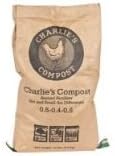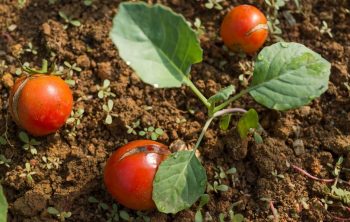Tomatoes and peppers are among some of the most popular plants to grow in gardens. They are both generally easy to maintain and produce an abundance of fruit. If you are wanting to grow some in your garden, you will want to know the best mulch for tomatoes and peppers.
Mulch can help provide your garden with the beneficial nutrients your plants need to grow. It can be a great addition to your garden to help your plants flourish. However, there are several varieties of mulch to choose from that it can be hard to know which is the right option for your garden.
Benefits Of Mulch In Your Garden
There are many benefits of having mulch in your garden. It is simple any material that covers the top of the
Increase Nutrients
The right mulch can increase the nutrients in your soil. As the mulch decomposes, it can improve the
Reduces Weeds
Weeds can be problematic for any garden, as they can take away water, light, and nutrients from the plants you are growing. By mulching your garden, you can help prevent weeds from popping up among your plants. In addition, weeds can be a sight sore in your garden as well.
Helps Maintain Optimum Soil Temperature
By adding a layer of mulch to the top of your
Reduce Soil Erosion
Mulch helps reduce

Can Help Prevent Diseases
Using mulch can help prevent diseases such as Blight. Blight is a
Best Mulch For Tomatoes And Peppers: What Is the Best Mulch For Tomato Plants And Peppers
Like many plants, both tomatoes and peppers can benefit from having mulch. Using mulch can help them grow healthy and strong, allowing for your plants to thrive and produce an abundance of fruit. Fortunately, there are several different types of mulches, both organic and synthetic, that your tomatoes and peppers can benefit from.
Wood Mulch
Wood mulch is one of the most popular types of mulch and can be a great option for both tomatoes and peppers. Bark chips or any fine wood mulch is a great option for your garden.
Not only does it look nice, but it can be great for preventing weeds from growing and can help improve the
Compost
Compost can be a great way to recycle organic matter while benefiting your garden. As one of the best mulch for peppers, it can provide a diverse healthy micro-life that can help improve the
Black tea compost is one of the best options for peppers as well as tomatoes. It is rich in water-absorbing organic matter, while not being high in salt, which can help seeds germinate. Compost with coffee grounds can be a great option for tomato plants.
Grass Clippings
If you use organic fertilizer on your lawn, grass clippings can be a great option for your tomatoes and peppers. Let your grass clippings dry out and then sprinkle them atop of your
Straw
Straw is one of the best mulch options to use for tomato plants. It can easily spread atop the
Leaves
Leaves make great mulch, particularly during the winter months. They provide great weed protection while also increasing
Peat Moss
Throughout the growing season, peat moss slowly decomposes, adding beneficial nutrients to your

Plastic Mulch
Black plastic mulch is commonly used among commercial tomato farmers. It helps retain heat and increases the production of the tomato plant. It must be put down in the spring and then later removed in the fall.
Red plastic mulch is also another popular choice as it retains heat in the
FAQs
What is the best mulch for tomato plants?
It depends on your situation. You have a number of factors to consider: How long do you expect the plant to live? How much time do you want to spend weeding? What are the temperatures likely to be? Are there other plants nearby that might be affected by weeds?
Tomatoes are a warm-weather crop and should be mulched during the summer months. They don't require a cold period like some other crops, so you don't need to mulch them with straw or hay.
Here's what I'd recommend: Black plastic mulch is an excellent choice for tomatoes because it keeps weeds down while protecting the roots. It's also biodegradable, which means it won't harm the environment.
The downside is that it's not easy to dig through when you're planting. So if you have a lot of space and want to save time and effort, then black plastic mulch is the way to go. It's not the best option if you want to save money, though, because it can be expensive. Plastic mulch is made from polyethylene and can cost anywhere from $1 to $4 per square yard.
You can use straw or hay to mulch your tomatoes. These options are inexpensive and work well. But they do take up space and require you to weed more often. You can buy hay or straw by the bale or in bulk at some gardening centers. Straw is usually cheaper than hay.
If you don't have a lot of space, then you can mulch with wood chips. Wood chips are a good choice because they are inexpensive, they don't take up a lot of space, and they also make your garden look great. They can also help keep weeds down because they decompose quickly. However, wood chips can get dirty and need to be cleaned regularly. Wood chips also make your soil compact, which can affect plant growth.
Is cedar mulch good for tomato plants?
It might work with your tomato plants. It will help with weed suppression. You can put it down around the base of the plant when you transplant, or you can wait until the plants are larger and more established.
Also, it will protect your plants from drought, especially if you are in a dry area. And it will keep your soil cool.
How should I mulch my tomato plants?
There are a few ways to mulch your tomatoes. The easiest way is to cover the tops of your plants with leaves, grass clippings, or straw. This method will keep the soil moist and will prevent weeds from growing. It's also easy to harvest the fruits, and if you're growing them in containers, it makes for a nice display. You can also lay down sheets of plastic or newspaper in a crisscross pattern around the plants.
No More Wondering What Is A Good Mulch For Tomatoes And Peppers
Mulch can be very beneficial for tomato and pepper plants. It can help prevent
Some of the best mulches to use for tomatoes and pepper include grass, wood mulch, straw, compost, leaves, peat moss, and plastic mulch. Each of these can help improve the
Do you have any questions regarding the best mulch for tomatoes and peppers? If so, please ask any questions regarding mulch and growing peppers and tomatoes in the comment section down below.

Anna is an avid gardener who loves the outdoors and spending time in nature. She has been gardening since she was a child and has a passion for growing her own food and flowers. She enjoys experimenting with different types of plants and techniques to create beautiful and bountiful gardens. She is always trying to learn more about gardening and is an active member of her local gardening club. She loves to share her knowledge and experience with others and is always willing to lend a helping hand. Anna believes that gardening is a great way to bring people together and foster a sense of community.





